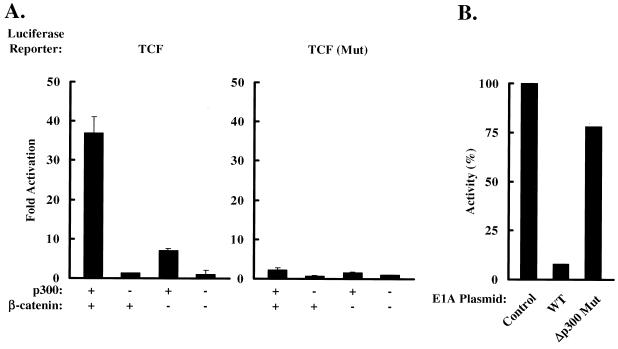Figure 2.
p300 activates β-catenin/TCF-mediated transcription. (A) p300 and β-catenin synergistically activate the transcription of the TCF reporter. 293 cells were transfected with wild-type (Left) or mutant (Right) TCF luciferase reporter and the plasmid expressing p300 and/or the plasmid expressing β-catenin as indicated. An RSV-β-gal construct (β-galactosidase gene with a Rous sarcoma virus enhancer/promoter) was included in all transfections as a control for transfection efficiency. Twenty-four to 48 h after transfection, the cells were harvested and the luciferase activity was measured. All luciferase activity (relative light units, RLU) was normalized against β-gal activity. The value of the RLU from cells transfected with reporter alone was arbitrarily set as 1, and the fold activation was calculated accordingly. 293 cells were transfected by using the calcium phosphate method as described (31). One-half microgram of TCF or mutant TCF reporter, 1 μg of β-catenin/pCDNA3, or 3 μg of pCMVp300 was used as indicated. pCDNA3 was used as filler DNA to ensure equal amount of DNA in each transfection. RK3E/S33Y cells were transfected by using Lipofectamine Plus transfection reagents (BRL) according to the manufacturer's protocol. RSV-β-gal (0.2 μg) was included in all transfections for standardization/normalization. Twenty-four to 48 h after transfection, the cells were lysed by using 1× reporter buffer (Promega) and the luciferase and β-gal activities were measured. (B) The transcriptional activation of the TCF reporter was inhibited by 12S E1A, but not by mutant E1A that does not bind p300. Wild-type (WT) TCF reporter was transfected into 293 cells with plasmids expressing 12S E1A or mutant E1A [Δp300 E1A (125 pm 563) (13), unable to bind p300]. Cells were harvested and their luciferase activity was measured as in A. The luciferase activity of cells (control) transfected with reporter alone is arbitrarily set to 100, and the percent inhibition was calculated accordingly.

